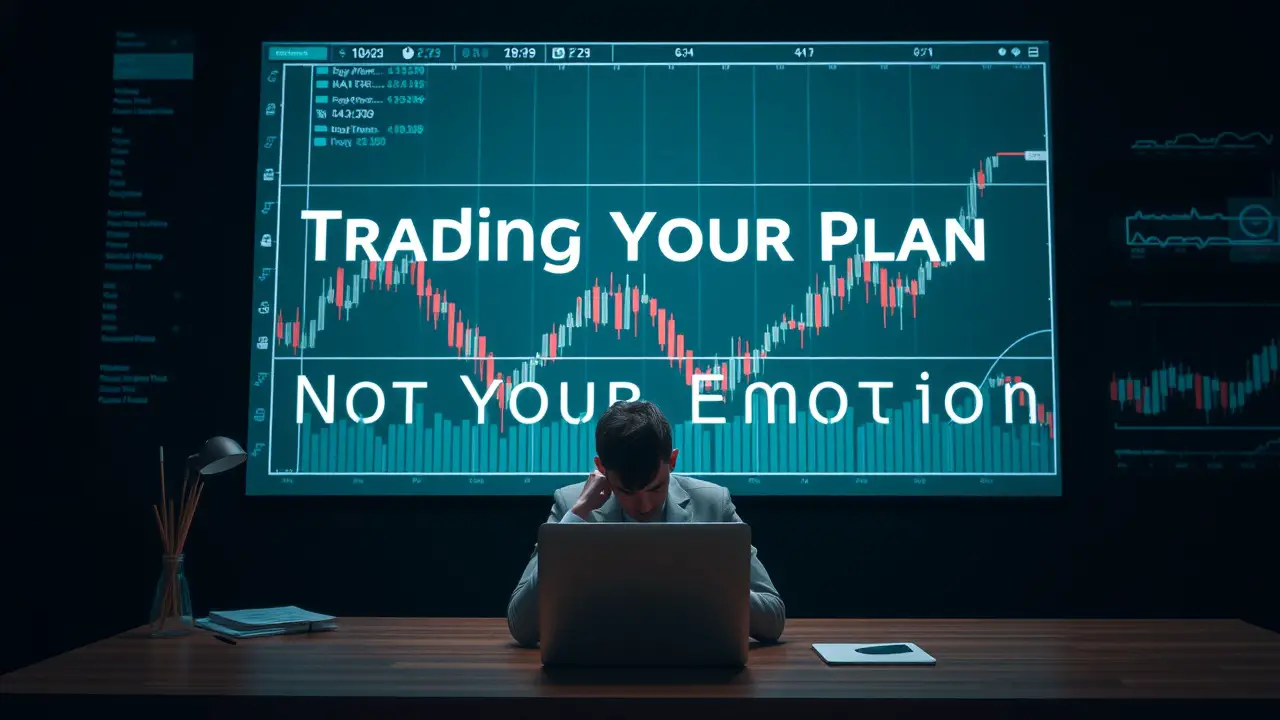Trade your plan not your emotion – One truth becomes increasingly clear: emotional discipline is paramount. The financial markets are not just a battleground for numbers and charts; they are also a psychological arena where emotions can run high. Fear, greed, and anxiety can cloud judgment, leading to impulsive decisions that deviate from a well-thought-out strategy.
Contents
I’ve learned that maintaining emotional discipline is not merely a suggestion; it’s a necessity for long-term success. When I manage my emotions effectively, I can approach trading with a clear mind, allowing me to make rational decisions based on my analysis rather than fleeting feelings. Moreover, emotional discipline fosters resilience.
In trading, losses are inevitable, and how I respond to these setbacks can significantly impact my future performance. By cultivating a mindset that prioritizes discipline over emotional reactions, I can view losses as learning opportunities rather than personal failures.
This shift in perspective not only helps me recover more quickly but also strengthens my resolve to stick to my trading plan. Ultimately, emotional discipline is the bedrock upon which successful trading is built, enabling me to navigate the complexities of the market with confidence and clarity.

Developing a Solid Trading Plan
Key Components of a Trading Plan
In crafting my trading plan, I focus on several key components: market analysis, trade criteria, and risk management strategies. I analyze historical data and current market trends to identify potential opportunities while also defining the parameters for my trades.
Setting Boundaries for Success
This includes setting stop-loss orders to protect my capital and determining profit targets that align with my overall objectives. By having these elements in place, I create a structured approach that allows me to remain disciplined, even when faced with the inevitable ups and downs of trading.
Staying Disciplined in Turbulent Markets
By taking the time to develop this plan, I am not only setting clear expectations for myself but also establishing a framework that helps mitigate the influence of emotions on my trading decisions.

The Dangers of Emotional Trading
Emotional trading can be a treacherous path that leads to significant financial losses. When I allow my emotions to dictate my trading decisions, I often find myself making hasty moves based on fear or excitement rather than sound analysis. For instance, during a market downturn, panic may drive me to sell off assets at a loss, while the thrill of a sudden price surge might tempt me to invest more than I should without proper evaluation.
These impulsive actions can erode my capital and undermine my long-term goals. Additionally, emotional trading can create a vicious cycle of poor decision-making. Each time I act on impulse, I reinforce the habit of letting emotions take control.
This not only affects my current trades but also impacts my future strategies and overall confidence as a trader. Recognizing the dangers of emotional trading has been a crucial step in my journey; it has prompted me to prioritize discipline and adhere strictly to my trading plan, ensuring that I make decisions based on logic rather than fleeting feelings. For more information on trading and the foreign exchange market, visit Wikipedia.

Strategies for Overcoming Emotional Trading
To combat the pitfalls of emotional trading, I have implemented several strategies that help me maintain control over my decisions. One effective approach is to establish a routine that includes regular reflection on my trades. By keeping a trading journal, I can document not only the outcomes of my trades but also the emotions I experienced during each decision-making process.
This practice allows me to identify patterns in my behavior and recognize when emotions may have influenced my choices. Another strategy involves setting clear rules for myself regarding entry and exit points. By adhering to these predetermined criteria, I can minimize the temptation to deviate from my plan based on emotional impulses.
Additionally, practicing mindfulness techniques has proven beneficial in helping me stay grounded during volatile market conditions. Whether through meditation or simple breathing exercises, these practices enable me to approach trading with a calm and focused mindset, reducing the likelihood of emotional interference.
How to Stick to Your Trading Plan
Sticking to my trading plan requires commitment and discipline, especially when faced with market fluctuations that can provoke emotional responses. One technique that has helped me remain steadfast is visualizing my goals and reminding myself of the reasons behind my trading strategy.
By keeping these objectives at the forefront of my mind, I can resist the urge to make impulsive decisions that stray from my plan.
Additionally, accountability plays a crucial role in maintaining adherence to my trading plan. Sharing my goals and strategies with fellow traders or mentors creates a support system that encourages me to stay disciplined.
Regular check-ins with this network help reinforce my commitment and provide valuable insights that keep me aligned with my objectives.
Ultimately, by cultivating both mental fortitude and external support, I can navigate the challenges of trading while remaining true to my established plan.
The Role of Risk Management in Trading
Risk management is an essential component of successful trading that cannot be overlooked. It serves as a safety net that protects my capital from unforeseen market movements and emotional decision-making.
By implementing effective risk management strategies, such as setting stop-loss orders and diversifying my portfolio, I can mitigate potential losses while maximizing opportunities for growth.
Understanding my risk tolerance is also vital in this process. By assessing how much risk I am willing to take on each trade, I can make informed decisions that align with my overall financial goals.
This awareness helps me avoid overexposure to any single asset or market condition, reducing the likelihood of emotional reactions when faced with volatility. Ultimately, risk management empowers me to trade with confidence, knowing that I have safeguards in place to protect my investments.

My Conclusion Seeking Professional
Recognizing when emotional trading becomes overwhelming is crucial for any trader’s journey. If I find myself consistently struggling with impulsive decisions or anxiety related to trading, seeking professional help can be a game-changer.
Therapists or coaches specializing in trading psychology can provide valuable insights and coping strategies tailored to my unique challenges.
Engaging with professionals allows me to explore the underlying emotions that may be influencing my trading behavior. Through therapy or coaching sessions, I can develop healthier coping mechanisms and learn how to manage stress more effectively.
This support not only enhances my emotional resilience but also reinforces my commitment to adhering to my trading plan. Ultimately, seeking help is not a sign of weakness; it’s an empowering step toward becoming a more disciplined and successful trader in the long run.












Leave a Reply